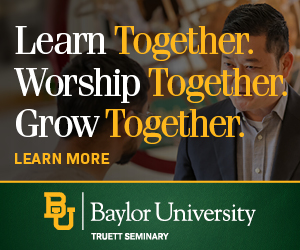Moderate Baptists have distinguished themselves through their elevation of freedom of conscience to a near-absolute good. While the conservatives who came to dominate the Southern Baptist Convention focused on defining and requiring (their particular version of) orthodoxy, moderate Baptists proclaimed freedom of individual conscience before God is a more distinctive Baptist principle than doctrinal conservatism.
Next-generation Baptists have raised questions about this relentless focus on freedom. Even those generally sympathetic to moderates have asked searching questions about the adequacy of freedom alone as the highest principle of moderate Baptist life and have proposed other models for what ought to be central to Baptist identity.
These questions about freedom should not go away. But I want to say a word on behalf of a rigorous understanding of freedom of conscience in Christian life and our institutions. It is a sacred value that easily disappears if not protected vigilantly.
Freedom of conscience in a Christian context means each individual who has committed to follow Jesus Christ is understood to be answerable to Christ himself. Freedom is not mere personal autonomy. Nor is it license to believe, say or do just anything. But when a Christian community values freedom of conscience, it recognizes the individual alone will give account before God on Judgment Day. It recognizes the community must protect the space in which each individual Christian can determine what pattern of belief and action is required by God.
To value such freedom of conscience strengthens rather than weakens commitment to the Lordship of Christ. It is because Christ is Lord, and because the believer stands in relationship with God, that freedom of individual conscience must be protected. The community dare not stand as an obstacle to the believer’s obligation to follow Jesus faithfully.
Most Christian communities have interpretive traditions that are broadly agreed upon in the community and that guide the exercise of individual conscience. Baptists have long agreed, for example, on the high role of Scripture and the secondary role of church tradition. These interpretive traditions help hold faith communities together and set parameters that can help order the religious life of individuals.
But such parameters, while useful, cannot resolve every issue. They cannot prevent sharp differences of opinion on a wide range of issues that arise in Christian thought and practice. Some Christian communities respond to these often-quite-uncomfortable differences by trying to come up with an expansive set of standards for orthodoxy and orthopraxy, which often tyrannize individual responsibility before God.
These standards can even make it impossible for Christian communities to hear any new word from God’s Spirit. For there are many examples of times in which God’s transforming word was first heard by scattered Christian outliers and rejected by the community as a whole until it finally broke through—with the path usually littered by the scarred bodies of the original outliers.
Think about the way racism infected Christian doctrine in the years leading up to the Civil Rights Movement. In many contexts, racism was viewed as a theological truth and segregation as a Christian moral requirement. God couldn’t be permitted to speak a new theological or moral word. It was too dangerous to the status quo.
Sign up for our weekly edition and get all our headlines in your inbox on Thursdays
The same thing happened 20 years later in relation to the role of women in Christian communities and families. I was among those who had to leave Southern Baptist Theological Seminary in the mid-1990s because my understanding did not match with the new orthodoxy, which changed overnight.
I am grateful currently to be in a congregation and a university in which expansive understandings of freedom of conscience before God are embraced. I am free to follow my conscience where it leads. I may misunderstand what Christ requires of me, but the space for me to do so is protected. This is a rare, precious and fragile gift. I hope no one takes it for granted. I sure don’t.
David Gushee is distinguished university professor of Christian ethics at Mercer University. His column is distributed by Associated Baptist Press.















We seek to connect God’s story and God’s people around the world. To learn more about God’s story, click here.
Send comments and feedback to Eric Black, our editor. For comments to be published, please specify “letter to the editor.” Maximum length for publication is 300 words.